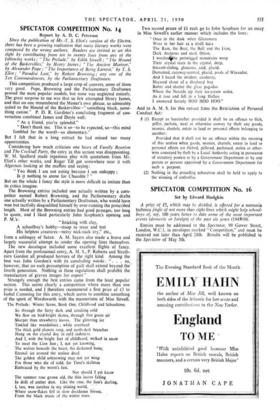SPECTATOR COMPETITION No. 14
Report by A. D. C. Peterson
Since the publication of Mr.Z. S. Eliot's version of the Electra. there has been a growing realisation that many literary works were composed by the wrong authors. Readers are invited to set this right by contributing from ten to twenty lines from any of the following works : "The Prelude," by Edith Sitwell ; "The Hound of the Baskervilles," by 'Henry James; "The Ancient Mariner," by Alexander Pope ; "The Importance of Being Earnest," by T. S. Eliot ; " Paradise Lost," by Robert Browning ; any one of the Ten Commandments, by the Parliamentary Draftsmen.
This competition produced a large crop of answers, some of them very good. Pope, Browning and the Parliamentary Draftsmen proved the most popular models, but none was neglected entirely. The great surprise to me was that so few attempted Henry James, and that no one remembered the Master's own phrase, so admirably Suited to the Hound of the Baskervilles—" something black, some- thing canine." P. D. R. Gardiner's concluding fragment of con- versation combined James and Doyle well:
" As a friend, you're splendid."
" Don't thank me. This is so—to be expected, so—{his mind fumbled for the word)—so elementary."
But I felt that in a long extract he had missed too many opportunities.
Considering how much criticism one hears of Family Reunion and The Cocktail Party, the entry in this section was disappointing. W. M. Spafford made ingenious play with quotations from Mr. Eliot's other works, and Roger Till got somewhere near it with Algernon looking at the muffins and saying :
" You think I am not eating because I am unhappy ; Is it nothing to atone for Chasuble ? " But on the whole I fancy the style is more difficult to imitate than its critics imagine.
The Browning entries included one actually written by a com- petitor named Robert Browning, and the Parliamentary drafts one actually written by a Parliamentary Draftsman, who would have won but tactfully disqualified himself by over-running the prescribed length. Most of the Browning entries had good passages, too long to quote, and I liked particularly John Scupham's opening and
P. M.'s:
" finicking with clay, A schoolboy's hobby—stoop to tease and test His helpless creatures—neivy nick-nick 'cry," etc., from a soliloquy of Satan. A. M. Sayers also made a, brave and largely successful attempt to render the opening lines themselves.
The new decalogue included some excellent flights of fancy. Apart from the professional entry, A. M. S., P. Roberts and Strath- earn Gordon all produced horrors of the right kind. Among the best was John Gordon's with its concluding words: " . . so, however, that no such presumption of guilt shall extend beyond then fourth generation. Nothing in these regulations shall prohibit the manufacture of graven images for export."
Strangely enough the best entries came from the least popular section. This seems clearly a competition where more than one prize is needed, and I therefore recommend a first prize of to Isobel Cumming for this entry, which seems to combine something of the spirit of Wordsworth with the mannerisms of Miss Sitwell. The Prelude: Winter Scene, Book One, Childhood and Schooltime.
So through the furry dark and creaking cold We flew on bird-bright skates, through thin green air Sharper than strawberry leaves. The glittering ice Tinkled like mandolines ; while overhead The thick gold planets rang, and earth-dark branches Hung on the crystal day in cold cadenzas.
And I, with the bright feet of childhood, Walked in snow To meet the Lion Sun ; I, not yet knowing, The wolves beneath the heart, the darkened bone,
Eternal ice around the sexless dead.
The golden child unknowing may not yet weep For those who die of cold, for Time's skeleton Embraced by the worm's lust. Nor should I yet know The summer rose grown old, the thin leaves falling In drift of amber dust. Like the rose, the Sun's darling,
I, too, was careless in my shining world, Where snow-flakes fell in slow deciduous bieves.
From the black music of the winter trees.
Two second prizes of £1 each go to John Scupham for an essay,
in Miss Sitwell's earlier manner which includes the lines:
" Once in the dusk when Glaramara Wore in her hair as a shrill tiara The Ram, the Bear, the Bull and the Lion, Dark Arcturus and stark Orion, I watchedithe periwigged mountains weep Their crystal tears in the crystal, deep, Smooth-sliding, glaucous, acid, glacid, Demented, caraway-scented, placid, pools of Winander.
And 1 heard the strident, corduroy, Hayseed shout of a shepherd boy Batter and shatter the glass pagodas Where the Nereids sip their ice-cream sodas.
As it rose and fell in a long Halloo I answered fiercely HOO HOO HOO."
And to A. M. S. for this extract from the Restriction of Personal Conduct Act:
8 (1) Except as hereinafter provided it shall be an offence to filch, pilfer, purloin, steal or otherwise convey by theft any goods, monies, chattels, estate in land or personal effects belonging to another: Provided that it shall not be an offence within the meaning of this section when goods, monies, chattels, estate in land or personal effects are filched, pilfered, purloined, stolen or other- wise conveyed by theft by a Local Authority acting in pursuance of statutory powers or by a Government Department or by any person or persons appointed by a Government Department for such a purpose.
(2) Nothing in the preceding subsection shall be held to apply to the winning of umbrellas.






































 Previous page
Previous page